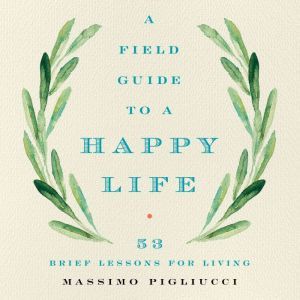Quotes
"A shrewd take on Stoic philosophy that's one part inspiration and one part manual for cultivating resilience in daily life. Pigliucci's prudent advice will have broad appeal among philosophically inclined readers of self-help."—Publishers Weekly
"A wonderfully fun introduction to Stoic philosophy, bursting with practical wisdom and engaging stories. I particularly admire how Pigliucci revisits and reinterprets Epictetus's Enchiridion while showing why we need a 'Stoicism 2.0' for twenty-first century happiness, and clearly illustrating how his version differs from the original. It's an excellent book, written in Pigliucci's splendidly lucid and accessible style."
—Skye C. Cleary, author of Existentialism and Romantic Love
"Pigliucci's A Field Guide to a Happy Life provides a user-friendly manual for applying Stoicism to daily life in the twenty-first century. Stoicism 2.0 tweaks the philosophy in order to adapt it to the moral intuitions shared by most modern readers. It therefore provides a good place to start your journey when exploring Stoic practices."—Donald Robertson, author of How toThink Like a RomanEmperor
"This short book is a 'field guide,'
written with busy non-specialists in mind. By dipping into its pages,
readers can simultaneously develop an understanding of Stoicism and gain
important insights into how best to live. Those who are already familiar with
Epictetus will appreciate Pigliucci's bold "update" of Stoicism in the book's
closing pages."—WilliamB. Irvine, author of The Stoic Challenge
"This is a bold, contemporary updating of Stoicism for the present day. Taking the ancient Stoic Epictetus as his inspiration, Pigliucci has rewritten Epictetus's Handbook in order to update it, make it more relevant to a modern audience, but also to ensure that the core Stoic ideas shine through. The result is what Pigliucci calls Stoicism 2.0. This is a manual for living for those who approach the ancient Stoics as guides, not masters."—John Sellars, author of Stoicism
"An engaging introduction to the Stoic life through an updated version of Epictetus's Handbook. An unusual and helpful feature is an appendix in which Pigliucci highlights his modifications of the original Stoic text to take account of modern thinking."—Christopher Gill, author of Greek Thought
"Pigliucci reimagines Epictetus's Handbook (a.k.a. the Enchiridion) and updates it for the twenty-first century. The result is a work more timely than ever, for it warns us of the dangers of superstition while it reminds us that reason and virtue are essential to happiness. Pigliucci speaks directly to us as readers and justifies his updates along the way. He thereby invites us to treat Epictetus and this very book as a reasonable guide rather than as an oracle from on high."—Brian E. Johnson,Fordham University




